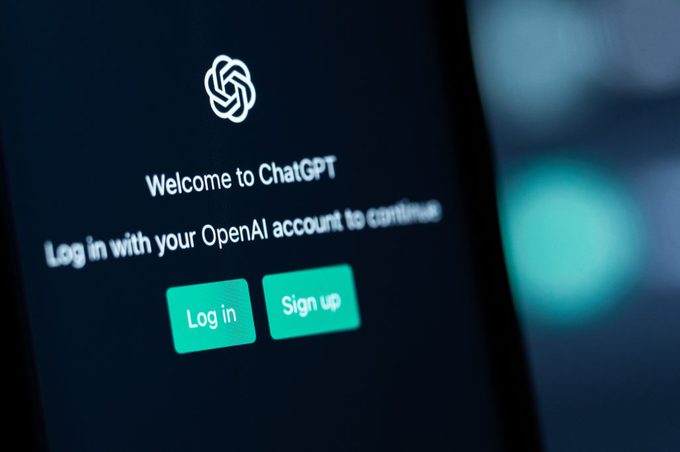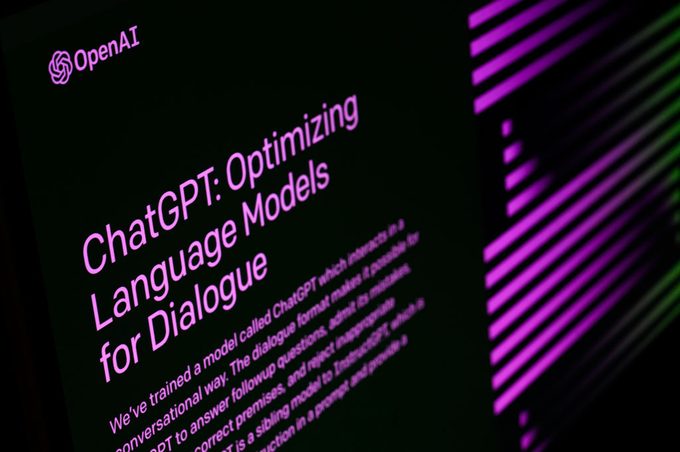Could ChatGPT Take Your Job? Here’s How to Keep It Safe
Updated: Nov. 23, 2023

An AI program called ChatGPT has been creating a lot of online buzz lately. But what exactly is ChatGPT, and will it take your job? Here's what you should know.
You’ve probably noticed that AI has been generating a lot of buzz lately. The truth is, this technology has been around for a while now, and the concept of artificial intelligence has existed for decades.
Artificial general intelligence, or machine sentience, may be what you think of when you hear “AI.” We are not yet close to developing this kind of AI, and we still don’t know if it’s even possible. The term AI, as used today, usually refers to highly specialized software tools. Everything from website chatbots to virtual assistants (think Amazon’s Alexa or Apple’s Siri smart helpers) has the “AI” moniker slapped on it nowadays. AI can also help you find the best career opportunities suited best for you.
At the forefront of all this recent chatter is ChatGPT, a cutting-edge language model designed by OpenAI. Newer AI models like ChatGPT are noticeably different from the automated systems of years past. They can process information and generate their own content in natural-sounding language, making them more sophisticated than something like a chatbot or search engine. But what does all this mean for the average person? Some claims you’ve seen about ChatGPT might be a bit hyperbolic, but there’s no denying that it has the potential to shake things up.
OpenAI designed ChatGPT as a tool to help people obtain information quickly and streamline certain workflow tasks. However, concerns have been raised that ChatGPT and other AI systems may end up replacing human jobs entirely. It’s true that the future of AI technology holds the potential to automate some routines and change the nature of certain professions. However, it’s important to remember that AI systems are merely tools designed to assist and enhance human abilities, not supplant them. If all this still has you a bit worried, then keep reading. Here, we’ll offer some insight into the capabilities of ChatGPT as well as some tips for future-proofing your career in the coming age of AI.
What is ChatGPT?

ChatGPT is an innovative software language model currently being developed by OpenAI, an American machine intelligence research laboratory. Still in its testing stages, this AI system is specifically designed to understand natural language processing and generate convincingly human-like responses to inquiries. A working test model was recently made available to the public, with data collected from user input becoming part of the current development phase.
ChatGPT can engage in conversations with users, answering questions and providing information. It’s powered by a massive dataset of text inputs gleaned from websites such as the English version of Wikipedia and from user interactions. This allows it to generate high-quality responses that sound much like those of human beings.
While there are concerns about the impact of AI technology on the job market, ChatGPT was made to assist and enhance human abilities. Think of it more as an AI assistant—it’s not meant to replace humans and that’s not part of OpenAI’s mission. As this futuristic tech continues to evolve, it’s likely that we’ll see more advanced language models appear (for example, Tesla CEO Elon Musk has already stated his intention to create a rival to ChatGPT). The optimistic view is that these AI systems can be highly useful tools to help us interface with technology in new and unique ways.
Is ChatGPT a threat to jobs?
It’s easy to see why the seemingly sudden appearance of advanced AI systems like ChatGPT has raised concerns about job displacement. But it’s important to remember that the concept behind ChatGPT is pretty simple: It’s a language model that uses machine learning to create human-like answers to user inquiries—that’s all.
ChatGPT could be considered something like an advanced chatbot. It’s a bit more complex than that, of course, but many of the technologies behind it have existed for some time. It’s a tool built to assist in a variety of tasks, from answering customer inquiries to helping with research and data analysis. Yet it’s far from being capable of replacing humans entirely.
AI technology indeed has the potential to automate certain tasks, but it’s probably not going to automate entire jobs any time soon. It’s far more likely to create new job opportunities in areas such as AI development, data analysis and machine learning. In fact, it’s already doing so, with the field of artificial intelligence research being a burgeoning tech industry right now.
The impact of artificial intelligence on the job market will vary widely across industries but ultimately comes down to how it’s integrated into these industries and how businesses and professionals choose to use it. But one thing is clear: AI technology isn’t going anywhere and will only continue to evolve. Since we’re not going to hit the “delete” button on AI, we’ll have to consider the benefits and drawbacks, find ways to leverage this technology in productive ways and build a future where AI systems like ChatGPT can be used to our advantage.
How to protect your career from ChatGPT

As technology, and AI systems in particular, continue to grow and become more sophisticated, it’s natural for people to be concerned about job security. But rather than seeing AI as a threat or a hindrance, professionals should work to enhance their skills, stay ahead of trends and learn to leverage this technology for their benefit.
The surest way to protect your job from AI is to focus on building uniquely human skills that are difficult or even impossible to automate. These include creativity, critical thinking, emotional intelligence and complex problem-solving skills.
For example, customer service workers can develop better interpersonal skills, empathy and the ability to handle complex inquiries. Similarly, healthcare professionals can focus on skills such as patient communication and care coordination. These things call for a high degree of personal interaction, human intuition and case-by-case decision-making.
Writers would do well to focus on developing their own voice and their ability to add the “human touch” to their writing. In specific areas such as copywriting and marketing, essential aptitudes like interpersonal communication, sales skills and the ability to adapt to a brand voice are also unlikely to be automated any time soon. Networking and developing trust with clients is central to the job as well. That’s yet another thing AI can’t do.
In fact, there are many things these AI systems like ChatGPT can’t do. Original idea creation is one example, and generating unique insights is another. Because these AI models draw from existing information to create their output, they cannot create truly unique and innovative content. That’s something that, as of now, only humans can do. ChatGPT is working from things that have already been said or written by people, after all.
For workers in tech, AI can actually be a boon. Pretty much every professional in the tech industry will benefit from developing knowledge and skills related to data analysis, machine learning and AI development. Moreover, these areas are sure to experience significant growth in the coming years. By staying up-to-date with new technologies and trends in fields such as machine learning, you can position yourself for success in a relatively young tech industry where demand for skilled professionals is only going to increase.
Rather than viewing AI as a threat, workers should aim to future-proof their careers by focusing on building skills that are uniquely human. By staying ahead of the curve, developing expertise in growing industries and learning to leverage these AI systems themselves, workers can thrive in a world that will be increasingly shaped and driven by AI.


















